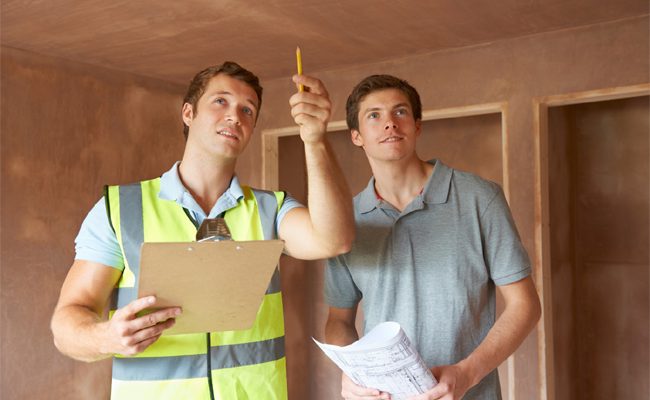
A building inspection for a new build home is an expert inspection of the property at different build stages. These inspections check that the construction meets building codes and local standards before you sign the dotted line on the building contract. The building inspector checks that the plans meet all relevant standards. They also check for any areas that might be a risk in the future, such as weak foundations or issues with plumbing or electricals. If anything needs to be rectified, they will note it in a report to provide to the builder. If you’re planning on building or renovating, it’s essential that you get a building inspection during the various build stages, so you get what you pay for.
What Does A Building Inspection Check For?
When you get a building inspection, the inspector will look at three main areas of the property: foundations, structure and systems.
Foundations – The inspector will check the types of materials used and how they were laid. They will also check all relevant permits and visit the site to see if the foundation has been poured correctly. They will also check underground utilities, such as water and gas lines.
Structure – The inspector will check for code violations, structural issues, and weatherproofing. They will check for issues like cracks in the walls and loose wiring and make sure that the wiring is up to local electrical code.
Systems – A building inspector will check for plumbing issues and ensure that the property is up to code for gas, water, and plumbing. The inspector will also look for pests and ensure that the property is pest-free.
Why You Should Have A Building Inspection
A building inspection is a crucial part of the building process. It’s also a great way to understand the home’s construction process. You can use the inspection resultsto ensure you get what you paid for and won’t encounter problems after paying the final amount or beyond the warranty period.
What are the types of inspections for new homes?
Building inspectors can carry out new home inspections at different stages of the build. It’s up to you if you’d like to have one, some or all of these inspections. These include:
Slab stage inspection
A slab stage inspection is a visual examination of the concrete slabs that have already been poured. A slab inspection is usually conducted once the concrete has cured enough to handle foot traffic. However, it can also be done earlier if necessary. There are several things the building inspector will look for during this type of inspection. For example, they will check for cracks, voids, and other structural issues in the slabs. They will also verify that the concrete is level and that there are no uneven areas.
Frame stage inspection
A frame stage inspection ensures that the framing is done correctly and according to codes. The inspector will look at how floor joistsconnect to walls and each other, and the waybeams connect to the walls is also inspected. The inspector will also make sure that there are no large holes in the floor, which could lead to a collapse and that no nails or other debris are left on the floor.
Lock up or enclosed stage inspection
A lockup stage inspection is conducted after construction is complete but before the home is ready for occupancy. A lockup inspection ensures that the builder has constructed the house per the approved plans and specifications and that all work is completed according to code.
Handover inspection
A handover inspection is a thorough inspection of a property conducted before the transfer of ownership. In addition to checking the property’s general condition, the inspector will also check that all the fixtures and fittings are present and in good working order.
Warranty Inspection
A warranty is there for a reason, to cover you for any defects that arise after the build. The warranty period is usually 12 months, and a warranty inspection should be completed within this timeframe. The building inspector will report any defects in the work, a report you can present to the builder and request they repair the defects under the warranty obligations.
Not sure which inspection suits your stage of the build? This is a great question to ask your building inspector.
The Final Checklist Before Handover
The best way to ensure that you get a quality new build before you sign the final contract and make your final payment is to get a second opinion. You should always get an unbiased building inspection for a new build home. This is essential for making sure the home is structurally sound, up to code, and getting what you paid for. You don’t want to be left with a new house full of defective work.
Lachlan Pascoe is the Director of Admired Building & Pest Inspections. Admired has a wide range of residential, commercial, and industrial inspection options, from new home and pre-purchase inspections to drone aerial and pool inspections. Lachlan and his team deliver building and pest inspections in Ipswich, Brisbane, Logan and Gold Coast.
Leave a Reply